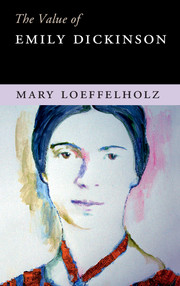2 - Some striding – Giant – Love –
Published online by Cambridge University Press: 05 June 2016
Summary
In Todd and Higginson's 1890 volume of Dickinson's poems, Book II, “Love,” comprising eighteen poems, follows directly upon “Life.” Aside from a couple of pieces in Dickinson's early floral gift-idiom and one late poem probably sent to Mabel Loomis Todd, almost all of these poems were transcribed into Dickinson's manuscript books, her present-day editors believe, between 1861 and 1865, her most concentrated period of poetic production. A few were also shared in her letters, but for many of them the fascicle copy is unique; so far as the surviving record can tell us, Dickinson did not share many of these poems with other readers during her lifetime, and no one correspondent seems to have been singled out consistently to receive those she did share. For readers who believe that something uniquely valuable about Dickinson's writings inheres in their direct, concrete address to familiar individual correspondents, these poems considered as a group provide no such hook on which to hang an account of why they matter. Yet I would wager that these poems – among them “Mine by the Right of the White Election” (Fr 411), “I cannot live with you” (Fr 706), “There came a day at summer's full (Fr 325), “I'm ceded – I've stopped being theirs” (Fr 353), “T'was a long parting, but the time / for Interview had come” (Fr 691) and “I'm Wife – I've finished that –” (Fr 225) – remain some of Dickinson's most important, across many communities of readers. And for every poem Todd and Higginson included in “Love,” readers could supply examples of many more inhabiting the same structure of feeling.
It is hard to settle for calling this generative structure, which looms so large in Dickinson's oeuvre, simply “love.” Not that Dickinson herself didn't use the word, and frequently; but to compare one of her definitional or riddling poems about love, such as “While it is alive” (Fr 287) or “Struck was I nor yet by lightning” (Fr 841), with her contemporary Elizabeth Barrett Browning's celebration of “love, mere love” in Sonnets from the Portuguese is to see how far Dickinson will go not to wallow in tautology.
- Type
- Chapter
- Information
- The Value of Emily Dickinson , pp. 37 - 56Publisher: Cambridge University PressPrint publication year: 2016

